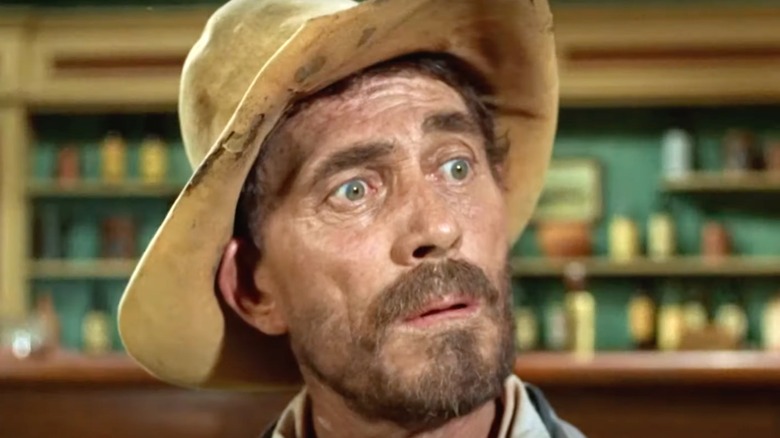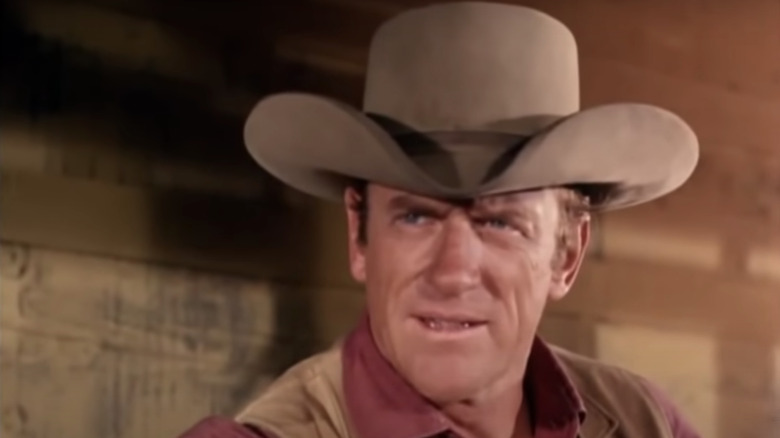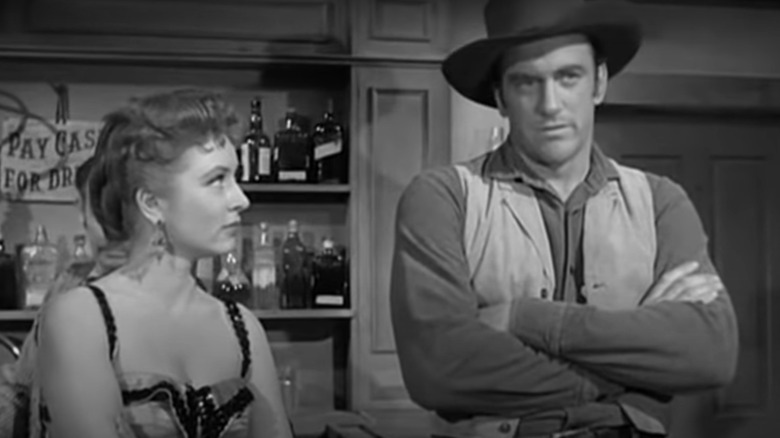Gunsmoke's Controversial Ending Still Doesn't Make Sense
In the 1950s, TV westerns came to dominate the television landscape. Of all the series to emerge, including "Bonanza" and "Rawhide," none enjoyed the longevity of "Gunsmoke." A staple of the shoot-em-up TV craze, the roots of "Gunsmoke" go back to 1952 when the series first aired as a radio program. The TV show came a few years later in 1955, and both programs would overlap until the radio show ended in 1961. Ultimately, "Gunsmoke" aired for 20 years between 1955 and 1975, broadcasting an incredible 635 episodes (via IMDb).
"Gunsmoke" follows the adventures of stoic lawman Marshal Matt Dillon (James Arness) as he strives to keep the peace in Dodge City, Kansas. Also starring were Dennis Weaver as his affable deputy Chester, Amanda Blake as saloon proprietor Miss Kitty Russell, Milburn Stone as Doc Adams, and Ken Curtis as Festus. Plenty of future stars also had guest spots or recurring roles on the series, including then-youngsters Ron Howard and Jodie Foster, and a then-little-known Burt Reynolds.
Given the show's tremendous tenure, one would assume that "Gunsmoke" went out in a blaze of glory. Unfortunately for our gunslinging heroes, that couldn't be further from the truth. Here's the truth behind the controversial conclusion of "Gunsmoke."
CBS abruptly canceled Gunsmoke without telling the cast and crew
The 1970s was not an era that skimped on big-finish finales. In 1977, "Roots" attracted an unprecedented number of viewers — roughly 140 million Americans — and the final episode is the second-most-watched series finale in TV history (via History). "Gunsmoke," meanwhile, went out with a whimper and not a bang. The final episode, "The Sharecroppers," is a cheery, practically throwaway tale about Festus who, upon accidentally shooting a farm boy in the leg, goes to work on his farm as penance. It certainly lacks the gravitas and closure that "Gunsmoke" deserved after two decades on the air, nor does it focus on the beating heart of the series, U.S. Marshal Matt Dillon.
The abrupt finish, it turns out, was by design on the part of the network. As chronicled in David R. Greenland's book, "The Gunsmoke Chronicles: A New History of Television's Greatest Western" (via Outsider), CBS canceled the series without informing the cast or crew. "All of us were ready ... for one more season of 'Gunsmoke,'" James Arness recalled. "CBS had led us downstream and then, when we were down to the wire, they dropped the ax."
Not even the series' producer, John Mantley, was given any warning; he reportedly learned of the news by reading the front page of The Hollywood Reporter. "They didn't have the courtesy to call him up," Arness said (via YouTube).
It wasn't the first time CBS tried to cancel Gunsmoke
CBS had eyed a "Gunsmoke" cancellation before, though it's hard to say why. "Gunsmoke" was the No. 1 show on television from 1957 to 1961, and continued to receive positive reviews through the 1970s. In any case, the series almost got the premature boot in 1967 — but not before it was saved by the capricious whims of a TV executive.
Upon learning that "Gunsmoke" was on the chopping block, the wife of CBS chief William Paley intervened in protest. "You can't cancel Gunsmoke," she said. "It's my favorite show" (via Esquire). Instead, she inadvertently caused the cancellation of "Gilligan's Island." To add insult to injury, "Gunsmoke" swooped in and stole the enviable "Gilligan's Island" time slot, catapulting the series back into the top 10.
By 1975, however, CBS execs had had enough of the gunslinging series, much to the consternation of the cast. "We finished the 20th year, we all expected to go on for another season, or two or three," Arness told the Amarillo Globe-News (via GunsmokeNet). "The [network] never told anybody they were thinking of canceling."
Had CBS given "Gunsmoke" the big finish it deserved, it could've gone out the way of "M.A.S.H." – with dignity, a sense of resolution, and millions more viewers tuning in.


